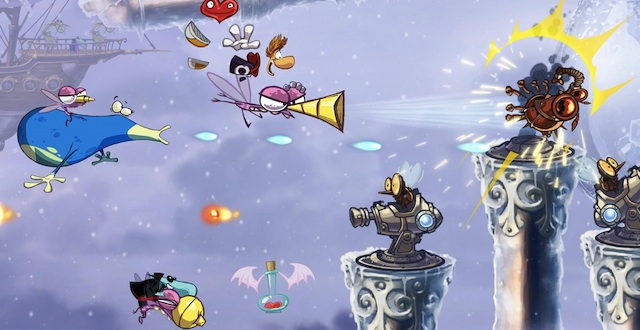The newest Rayman game is a product of the French, and it shows. Michel Ancel, a designer born in Monaco, created the character more than 15 years ago as a showpiece for the ill-fated Atari Jaguar. He’s back in charge of the series, and his French roots nourish every aspect of Rayman Origins. Behold a near-gluttonous love of food: instead of the genre’s typical lava, heat and ash comes from the glowing embers of a hot grill. Listen, and hear the incessant rhythm of New Orleans’ French Quarter: piano walkways plink underfoot and half notes float by on currents of sheet music.
More than anything, the very existence of this game speaks of the French resistance to popular trends (see: Jerry Lewis, Nicolas Sarkozy). In 1990, David Lynch’s Wild at Heart won the Palme D’Or at the famous Cannes Film Festival; test audiences repeatedly walked out of the theater. If you like it, the French don’t care. If you don’t, odds are they will love it. And so we have a gorgeously animated, mascot-driven 2D platforming game released in a generation that swoons over gritty, open-world, first-person gun operas. Until recently, Nintendo had this genre all to its lonesome. With Rayman Origins, the subversive minds at Ubisoft Montpellier have crashed the party and spiked the punch. Add too much rum to juice, and you can no longer taste the fruit. The plus side? You’re too woozy to care. I repeat: This is a very French game.
I lived outside of Lille, France for a year, and in that time I learned three things about my new neighbors: They are straightforward, they are beautiful, and they take their goofy cartoons quite seriously.
So, too, is Rayman Origins these things and more. Its strength is in its linearity. This is an A-Z experience, and such blunt direction is refreshing in an era of Do Anything, Explore Anywhere expanses. With its singular path, sequence and flow become important. Most platformers feel constructed by psychology grad students testing all variables. Here’s the Green One. Now here’s the Blue One. Okay, try the Red One. Good! Origins transitions smoothly between worlds due to a very simple choice: Each boss fight takes place in the next world’s themed environs. The progression seems more natural, even if the lines have only been blurred and not completely erased.
Between levels, however, momentum screeches to a halt. A large test tube fills with that level’s collected goodies, and there is no way to skip or speed up the animation. Perhaps the counting sequence covers otherwise distracting loading times, but the pause is disruptive all the same. That each stage plays out so fluidly makes the minor quibble stand out all the more. It’s like riding in a car driven by a novice. The ride is smooth until that erratic, inevitable pump of the brakes. But my, oh my: what scenery! Foreground objects blur, giving dimension to the 2D levels. Underwater caverns shimmer with realistic fractals, phosphorescent amoebae lighting the way. Clouds swirl above majestic mountain ranges in the distance.
The formula is an established one—bop on creatures’ heads, gather shiny things, leap over unexplained pits—and such ease of operation allows you to enjoy this world’s sheer living beauty. The drawn artwork is more living cartoon than matte painting; everything moves, and everything seems alive. Most things are, in fact. That floating swing is actually a sentient, smiling blob, whose hands extend toward you and fling you on your way. What would normally be a generic wrecking ball becomes a puffer fish with uncertain eyes; elsewhere, you jump over not a rotating spike but the frowning cross-section of an orange, ringed in juicy thorns. Your character doesn’t merely run through a game world. Instead, the entire world is a character, with its own behavior and style.
Sometimes that style comes on a bit strong. At perfect completion of a level, the screen bursts with disco lights as Rayman breakdances. Pelvic thrusts are not uncommon. For a forest creature with no limbs, I guess such feats should be praise-worthy; to me, the showy wackiness was off-putting. Every character speaks in Pig Latin, another decision that feels a tad precious. Or maybe my heart has hardened with age.
But even if the game’s humor misses my ticklish spots, I appreciate the attempt, and some jokes land. Any frumpy hero can collect stars or coins. Rayman tasks you with gathering the missing teeth of an old coot who protects the land of the undead. The twisted request fits snugly into a scenario that’s one part The Three Stooges, one part Persephone’s myth, with a hint of Freud’s The Interpretation of Dreams.
Origins touts the ability to play the main game with three others, a ménage à quatre full of inflated members and slapping. (The French love a good non sequitur, almost as much as double entendres.)
Ancel and his creation have made his home country proud. The platforming genre, once dominant, has now been relegated to counterprogramming. Titles large and small—Super Mario 3D Land, Limbo, Donkey Kong Country Returns, Ms. ‘Splosion Man—gain players’ attention like a romantic comedy on the weekend of a summer blockbuster’s release. Origins makes a strong case for platformers to regain their tentpole status. Such comparatively quaint experiences need not exist as nostalgic portals to earlier joys, or palate cleansers between each grimy deathmatch. Origins is a good contemporary game, full stop. Its lack of grandiosity is made up in tight design and the palpable enthusiasm of its creators. But perhaps its greatest success is showing us, again, the elegant splendor of left-to-right, that certain je ne sais quoi.
